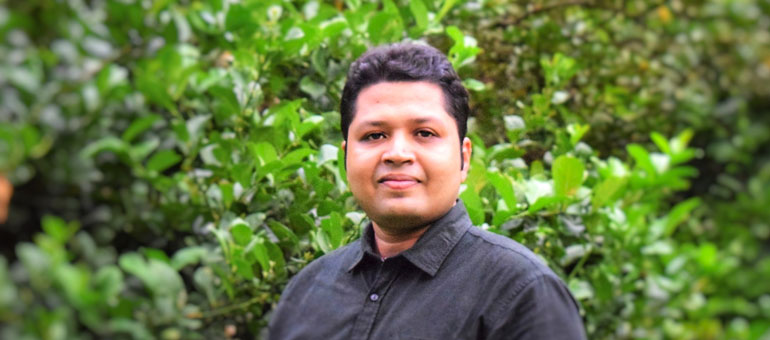What are your responsibilities as Programme Associate for the Food Policy and Financing programme in Bangladesh?
I joined GAIN in August 2015 and since then I have learned a lot. I initially started as an Intern for the Maternal and Young Child Nutrition (MIYCN) Home Fortification programme and then became an Associate for the Large-Scale Food Fortification (LSFF) and Value Chain programme. I am working as a part of the LSFF and Value Chain team to move forward the agenda for food fortification in Bangladesh, in close collaboration with the Government (Ministry of Industry and Ministry of Health), businesses (refineries, associations, wholesalers, retailers), civil society and other stakeholders. As part of my responsibilities, I am supporting programme implementation and multisectoral coordination. In addition, I lead on innovation and technical support for quality assurance (QA) and quality control (QC).
During my time at GAIN, I also had the opportunity to support phase II of the MIYCN Home Fortification programme and Workforce Nutrition in Bangladesh.
What motivated you to work at GAIN?
Imagine that you work hard from dawn to dusk, and yet your pay is so poor that it can hardly feed your family. Imagine that basic human rights are not applicable to you. Imagine that your children do not have access to proper food, nutrition, health, hygiene and education. Imagine that you and your family live in slavery for centuries in the vicious cycle of poverty and malnutrition. This is not a story; this is exactly what I saw in tea garden plantations in Bangladesh during my field placement as part of a Master’s programme in Public Health (MPH) in 2013. After this experience, I felt an irresistible urge to help vulnerable populations and work towards finding low-cost sustainable solutions - such as exclusive breastfeeding, infant and young child nutrition, micronutrient powders (MNPs), and affordable fortified food. I found GAIN as an excellent platform to harness the power of nutrition and work for the people who are most vulnerable to malnutrition.
Which are the most rewarding aspects of your work?
What could be more rewarding than being part of a journey which aims to bring positive change in human lives? GAIN allows me to develop my passion and my skill set to improve technical know-how. GAIN also offers a precious opportunity to use the life-changing power of nutrition for a greater purpose - through innovations, alliance building and cross-sectoral implementation.

Atanu Chanda is Programme Associate, Food Policy and Financing, and is based in the GAIN office in Dhaka, Bangladesh. © GAIN
What are the main challenges you face in your work?
For me the major challenge is to work in donor-dependent programmes. Such programmes are more focused on donor wishful thinking than on what a country really needs. Donor dependency is also inhibiting the legacy behind a programme, as we need to shift the focus from our own working schedule to availability of funds and donor priorities. For example, the Government of Bangladesh recently released the National School Meal Policy 2019. This policy is a paradigm shift from fortified biscuits to hot cooked midday meals. In 2012, GAIN and its partners - Dubai Cares and the Government of Bangladesh - jointly inaugurated the first pilot project of hot cooked midday meals in Bangladesh. This was a ground-breaking intervention for the School Nutrition Programme (SNP), which was finally adopted by the Government in the National School Meal Policy. However, GAIN was not able to carry on with that project due to unavailability of funds. Other development partners (e.g. the World Food Programme) took the opportunity to leverage their profiles in this area. As a result, the Government of Bangladesh recognised the World Food Programme as its key development partner in its new policy.
Which is your greatest achievement in this role so far?
I think it is a bit difficult to say which is my greatest achievement so far, as I am always in an elusive search for affordable and sustainable solutions to end hidden hunger. I am very proud of my work to make a real difference in the lives of millions of infants in Bangladesh - through exclusive breastfeeding, infant and young child feeding, micronutrient powders, behaviour change communication, women’s empowerment and entrepreneurship development. I believe that I have not only helped vulnerable malnourished people survive, but also thrive.
In your view, which is the greatest nutrition challenge facing Bangladesh today and how can this be solved?
According to the "National Micronutrient Survey 2011-2012", the population of Bangladesh suffers from a very high deficiency of vitamin D, with a prevalence of 45.5% in school-aged children. The vitamin D plays an important role in our bodies, by maintaining normal levels of calcium and phosphate in the blood, which in turn facilitates bone mineralisation, contraction of muscles, nervous system activities and cellular functions. In the "National Strategy for Prevention and Control of Micronutrient Deficiencies in Bangladesh 2015-2024", there is no programme for preventing vitamin D deficiency among the high-risk population groups in the country. Adding vitamin D in edible oil fortification can be a great solution to this complex problem. In Bangladesh, GAIN is leading the agenda for fortification of edible oil with vitamin A. Therefore, I think it is time to go for double fortification of edible oil with vitamin A and D and combat vitamin D deficiencies in Bangladesh.